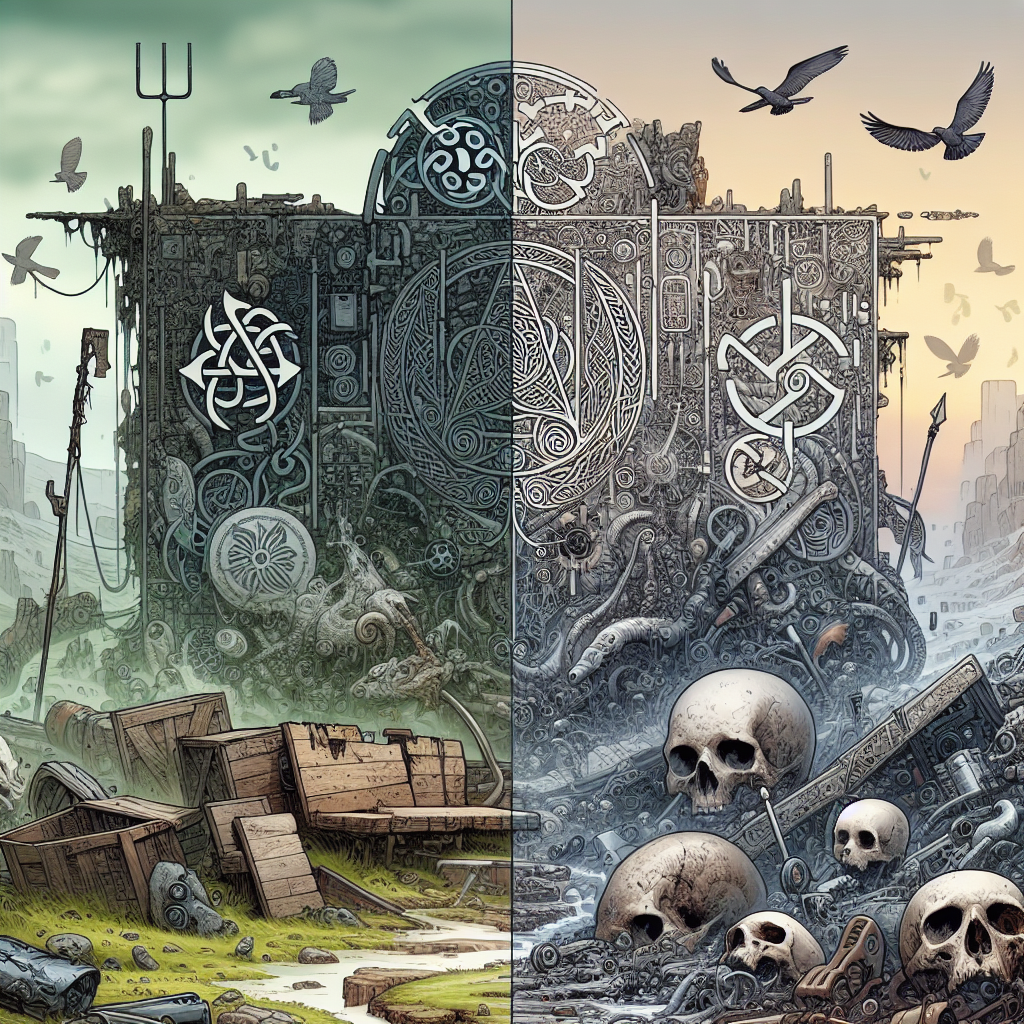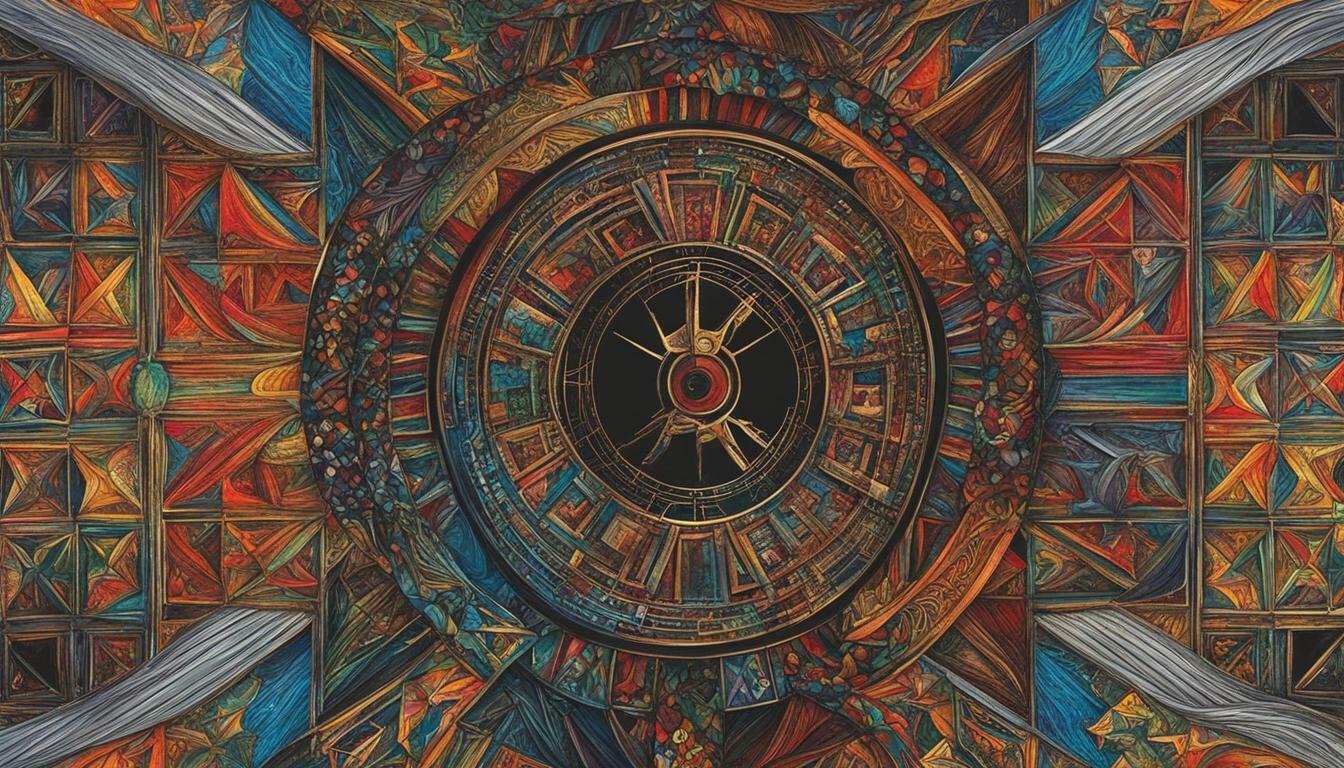Spiritualism and theism have distinct perspectives on the afterlife, with contrasting beliefs about what happens to the soul or spirit after death. Spiritualism believes in the ability of the spirit of the deceased to communicate with the living. It also holds that there is an afterlife where spirits can evolve and potentially be reborn. Moreover, spiritualism asserts that spirits possess knowledge about God and the afterlife, which they can share with the living.
Theistic beliefs, on the other hand, typically refer to organized religions that posit an afterlife determined by a deity. Within different theistic religions, the specific beliefs about the afterlife can vary. However, they commonly involve the concept of reward or punishment based on an individual’s actions and beliefs during their lifetime.
Key Takeaways:
- Spiritualism and theism differ in their beliefs about the afterlife.
- Spiritualism emphasizes the communication between the living and the spirits of the deceased.
- Spiritualism suggests the potential for rebirth and evolution of spirits in the afterlife.
- Theism generally refers to organized religions that believe in a deity-determined afterlife.
- Theistic beliefs about the afterlife often involve reward or punishment based on moral conduct.
Understanding Spiritualism’s View on Afterlife
Spiritualism holds the belief that the afterlife involves ongoing communication between the spirits of the dead and the living, with the possibility of spiritual evolution and even reincarnation. This perspective emphasizes the existence of a spiritual realm where spirits can continue to interact and provide guidance to those in the physical world.
According to spiritualist beliefs, the afterlife is not a static or solitary existence, but rather a dynamic journey of growth and development. Spirits are believed to continue their spiritual progress, learning from their experiences and evolving towards higher levels of understanding and enlightenment.
Furthermore, spiritualism suggests that in some cases, spirits may choose to be reborn into new physical bodies, resulting in the concept of reincarnation. This belief is based on the idea that individuals have multiple lifetimes to learn and evolve, with each life presenting new opportunities for spiritual growth.
Mediumship and Spirit Communication
In spiritualism, mediums play a significant role in facilitating communication between the living and the spirits of the deceased. These individuals are believed to possess the ability to connect with the spirit realm and relay messages from loved ones who have passed away. Mediumship practices and séances are common in spiritualist communities, providing opportunities for people to receive messages and insights from the departed.
Table:
| Beliefs | Spiritualism | Theism |
|---|---|---|
| Afterlife | Ongoing communication, spiritual evolution, and reincarnation | Rewards or punishments based on actions and beliefs during life |
| Mediumship | Practices and séances for spirit communication | No specific emphasis on mediumship |
Despite the differences between spiritualism and theism, both perspectives offer unique insights and beliefs about the afterlife. Understanding these contrasting views can deepen our understanding of the diverse ways in which individuals and communities conceptualize and engage with the realm beyond life.
Exploring Theism’s View on Afterlife
Theism encompasses organized religions that hold varying beliefs about the afterlife, with the general notion that one’s actions and beliefs during life will determine their fate in the eternal journey. These beliefs are shaped by religious texts, spiritual leaders, and cultural traditions. While the specific details may differ among different theistic religions, there are some common themes that emerge when exploring the theistic view on the afterlife.
One key belief is the existence of heaven and hell. Many theistic religions believe in the concept of a heavenly realm where the souls of the righteous are rewarded with eternal peace and happiness. Conversely, they believe in a hellish realm where the souls of the wicked endure punishment for their transgressions.
Another important aspect is the idea of judgment. Theistic religions often believe that a divine entity, such as God or gods, will pass judgment on individuals after death. This judgment is based on a person’s actions, moral conduct, and adherence to the religious teachings. The outcome of this judgment can determine the individual’s fate in the afterlife.
Furthermore, the theistic view on the afterlife often includes the concept of reincarnation. Some theistic religions, such as Hinduism and certain sects of Buddhism, believe in the cyclical nature of life and death. They believe that individuals will be reborn into new bodies based on their karma, the consequences of their actions in previous lives. The cycle of reincarnation continues until ultimate liberation or union with the divine is achieved.
| Theism’s View on Afterlife | Key Beliefs |
|---|---|
| Heaven and Hell | Reward for the righteous and punishment for the wicked |
| Judgment | Divine assessment of a person’s actions and moral conduct |
| Reincarnation | Cyclical nature of life and death, with rebirth based on karma |
Similarities Between Spiritualism and Theism on Afterlife
Despite their contrasting perspectives, spiritualism and theism share certain ideas and concepts when it comes to the afterlife. Both belief systems acknowledge the existence of a realm beyond death, where the soul or spirit continues to exist in some form. While the specifics may differ, both spiritualism and theism recognize the continuation of consciousness after physical death.
Additionally, spiritualism and theism both emphasize the importance of moral conduct and the impact it has on an individual’s afterlife experience. Both belief systems teach that one’s actions and beliefs during life can influence their fate in the afterlife. Whether it is through the concept of karma or the judgment of a divine being, there is a shared recognition that moral behavior is significant in shaping the post-mortem existence.
Furthermore, spiritualism and theism recognize the potential for communication between the living and the dead. While spiritualism places a greater emphasis on this communication and views it as an integral part of the afterlife experience, theistic religions also acknowledge the possibility of divine messages or signs from the deceased. This suggests a common belief in the continued presence and influence of spirits or souls in the realm beyond death.
| Similarities Between Spiritualism and Theism on Afterlife |
|---|
| Existence of a realm beyond death |
| Importance of moral conduct in shaping the afterlife |
| Potential for communication between the living and the dead |
In conclusion, while spiritualism and theism may have distinct beliefs and practices regarding the afterlife, they also share common ground. Both recognize the existence of an afterlife, stress the significance of moral behavior, and acknowledge the potential for communication between the living and the deceased. These shared ideas and concepts point to the universal human fascination with and exploration of the mysteries surrounding life after death.
Contrasting Views on Afterlife: Spiritualism vs. Theism
While spiritualism and theism may share some beliefs about the afterlife, there are significant differences in their perspectives, practices, and concepts related to the eternal journey. Spiritualism, with its emphasis on spirit communication and potential for reincarnation, offers a unique perspective on the afterlife. In spiritualism, it is believed that the spirit of the dead can communicate with the living, providing guidance and knowledge about God and the afterlife. This belief in spirit communication sets spiritualism apart from theism.
On the other hand, theism, which encompasses various religious beliefs, holds that the afterlife is determined by a higher power, such as a deity. Different theistic religions have varying beliefs about the afterlife, but they generally involve the concept of rewards or punishments based on one’s actions and beliefs during life. Theism encompasses a wider range of beliefs and practices, including notions of heaven, hell, judgment, and salvation. These concepts shape the theistic perspective on the afterlife.
When comparing spiritualism and theism on their views of the afterlife, it becomes clear that these two belief systems diverge on their understanding of the eternal journey. Spiritualism focuses on the continuous evolution of spirits, the potential for rebirth, and the interaction between spirits and the living. Theism, on the other hand, centers around the idea of a divine judgment and the consequences of one’s actions in shaping their afterlife experience. This fundamental distinction sets the stage for contrasting practices, rituals, and concepts that are unique to each belief system.
In summary, while both spiritualism and theism hold beliefs about the afterlife, their perspectives, practices, and concepts differ significantly. Spiritualism places importance on spirit communication, reincarnation, and the role of spirits in providing knowledge about God and the afterlife. Theism, encompassing a range of religious beliefs, focuses on divine judgment and the consequences of one’s actions in shaping their afterlife experience. These divergences shape the contrasting views of the afterlife in spiritualism and theism.
| Keywords |
|---|
| Difference Between Spiritualism and Theism on Afterlife, spiritualism vs theism afterlife, similarities and differences between spiritualism and theism on afterlife, understanding the afterlife in spiritualism and theism, spiritualism and theism perspectives on the afterlife, comparing spiritualism and theism on afterlife views, afterlife concepts in spiritualism and theism. |
Examining Afterlife Concepts in Spiritualism and Theism
Both spiritualism and theism have distinct afterlife concepts that play a significant role in shaping their respective spiritual and religious practices. In spiritualism, the belief in an afterlife is closely tied to the idea that the spirits of the deceased can communicate with the living. This belief forms the basis for practices such as mediumship and spirit communication, where individuals seek to connect with spirits for guidance, messages, and insights about the afterlife.
Spiritualism also encompasses the belief in the potential for reincarnation, where spirits can be reborn in new physical bodies to continue their spiritual journey. This concept of spiritual evolution through multiple lives is seen as a means for spirits to learn and grow, ultimately progressing towards higher levels of consciousness. It is believed that each life presents opportunities for spiritual development and the resolution of karmic obligations.
On the other hand, theism generally refers to organized religions that hold beliefs about the afterlife based on the existence of a deity. While specific theistic religions may have different interpretations, the general notion is that a person’s actions and beliefs during life will determine their fate in the afterlife. This can involve concepts of heaven and hell, where virtuous individuals are rewarded with eternal bliss in the presence of the divine, while those who have led immoral lives face eternal punishment or separation from the divine.
Conclusion
In conclusion, spiritualism and theism offer distinct perspectives on the afterlife. Spiritualism emphasizes communication with spirits and the possibility of reincarnation, while theism focuses on the concept of judgment and rewards or punishments based on moral conduct in life.
Spiritualism believes that the spirit of the dead can communicate with the living, providing knowledge about God and the afterlife. It also suggests that there is an afterlife where spirits can evolve and potentially be reborn. This perspective highlights the importance of maintaining a connection with the spiritual realm and seeking guidance from spirits.
On the other hand, theism refers to organized religions that believe in an afterlife determined by a deity. The specific beliefs about the afterlife can vary among different theistic religions, but they generally revolve around the idea of being judged based on one’s actions and beliefs during life. Theism emphasizes the concept of rewards or punishments in the afterlife, which serve as a motivation for leading a moral and ethical life.
While both spiritualism and theism acknowledge the existence of an afterlife, their differing perspectives reflect their unique beliefs and practices. Spiritualism focuses on the connection between the living and the spiritual realm, while theism emphasizes the role of divine judgment and moral conduct. Understanding these differences can provide a deeper appreciation for the diversity of beliefs and philosophies surrounding the afterlife.
FAQ
What is spiritualism’s view on the afterlife?
Spiritualism believes that the spirit of the dead can communicate with the living and that there is an afterlife where spirits can evolve and potentially be reborn. Spiritualism also believes that spirits provide knowledge about God and the afterlife.
What is theism’s view on the afterlife?
Theism generally refers to organized religions that believe in an afterlife determined by a deity based on a person’s actions and beliefs during life. The specific beliefs about the afterlife can vary among different theistic religions, but they typically involve some form of reward or punishment based on moral conduct.
What are the similarities between spiritualism and theism on the afterlife?
Despite their overall differences, spiritualism and theism may have some common ground regarding the afterlife. Shared beliefs or concepts may exist, although they vary between different spiritual and religious practices.
How do spiritualism and theism differ in their views on the afterlife?
Spiritualism focuses on the belief that the spirit of the dead can communicate with the living and that there is potential for spirits to evolve and be reborn. Theism, on the other hand, generally believes in an afterlife determined by a deity, where rewards or punishments are based on one’s actions and beliefs during life.
What are some afterlife concepts in spiritualism and theism?
Within spiritualism, the concepts of spirit communication, reincarnation, and gaining knowledge about God and the afterlife through spirits are prominent. In theism, afterlife concepts can vary among different religious beliefs, but they often involve rewards or punishments based on a person’s moral conduct.



